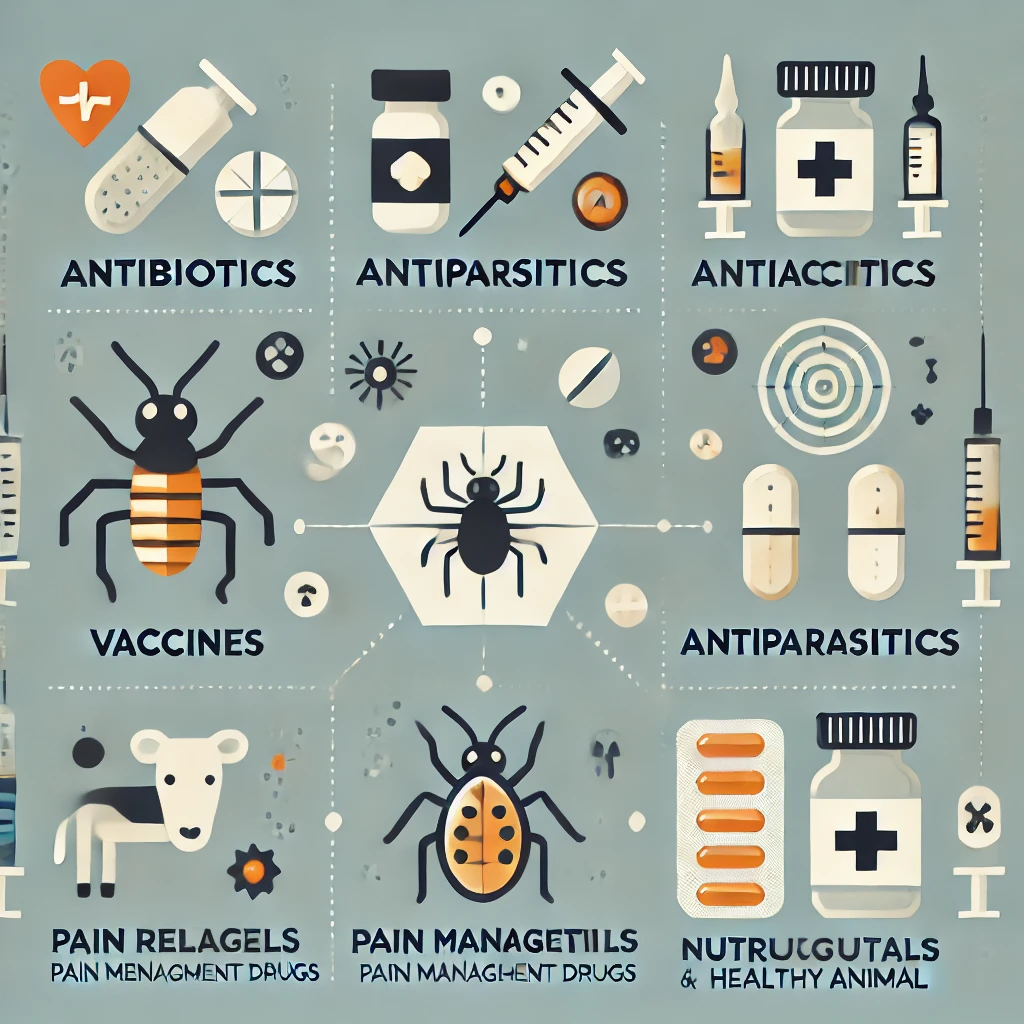- Veterinary PCD & Third Party Manufacturing
- +91-9023639358
- vetnationpharma@gmail.com
Veterinary Pharmaceuticals in India
Veterinary Pharmaceuticals: Vetnation Pharma
Veterinary pharmaceuticals play a pivotal role in maintaining the health and welfare of animals. From livestock to companion pets, these specialized medicines address various health concerns, ensuring longevity and productivity. This article explores the significance of veterinary pharmaceuticals, top medicines, their benefits, and answers to common questions about this essential field.
What Are Veterinary Pharmaceuticals?
Veterinary pharmaceuticals refer to drugs, vaccines, and biologics designed specifically for the treatment, prevention, and management of diseases in animals. They cater to a broad spectrum of species, including pets, livestock, poultry, and exotic animals.
Importance of Veterinary Pharmaceuticals
- Disease Management: Treat infections, injuries, and chronic conditions in animals.
- Prevention: Vaccines and preventive drugs reduce the risk of diseases.
- Economic Benefits: Ensure the health and productivity of livestock, benefiting farmers.
- Animal Welfare: Improve the quality of life for pets and working animals.
- Public Health: Prevent zoonotic diseases that can transfer from animals to humans.
Types of Veterinary Pharmaceuticals
1. Antibiotics
Used to treat bacterial infections in animals, ensuring recovery from diseases like pneumonia, mastitis, or skin infections.
2. Vaccines
Preventive medications that safeguard animals from diseases like rabies, parvovirus, or foot-and-mouth disease.
3. Antiparasitics
Effective against internal and external parasites, such as worms, fleas, and ticks.
4. Pain Management Drugs
Medications like NSAIDs help alleviate pain caused by injuries, surgeries, or chronic conditions like arthritis.
5. Nutraceuticals
Supplements that improve overall animal health, including joint support, coat health, and immune boosters.

Top Veterinary Pharmaceuticals for Common Animal Health Issues
| Condition | Top Medications |
| Bacterial Infections | Amoxicillin, Cefpodoxime, Enrofloxacin |
| Parasite Control | Ivermectin, Fenbendazole, Selamectin |
| Pain and Inflammation | Meloxicam, Carprofen, Flunixin |
| Skin Conditions | Miconazole, Ketoconazole, Prednisolone |
| Vaccination | Rabies Vaccine, Canine Distemper, FMD Vaccine |
How Veterinary Pharmaceuticals Benefit Farmers and Pet Owners
- Farmers: Veterinary medicines protect livestock from diseases, ensuring higher productivity and better yields. Healthy animals contribute to the economy by providing quality meat, milk, and wool.
- Pet Owners: For pets, these pharmaceuticals enhance quality of life, treat ailments, and prevent illnesses, ensuring companionship for years.
Role of Veterinary Pharmaceutical Companies
Veterinary drug manufacturers are crucial to the development and supply of safe, effective, and affordable medications for animals. The best companies focus on:
- Research and Development: Innovating new treatments and vaccines.
- Quality Standards: Adhering to global standards like GMP (Good Manufacturing Practices).
- Product Diversity: Offering a wide range of medicines for different species and conditions.
- Accessibility: Ensuring availability even in rural areas for livestock care.
Choosing the Right Veterinary Pharmaceuticals
- Consult Your Vet: Always seek a veterinarian’s guidance for accurate diagnosis and treatment.
- Check Certifications: Ensure the medicines are from GMP-certified manufacturers.
- Read Labels Carefully: Follow instructions for dosage and administration.
- Monitor for Reactions: Watch your animal for any adverse effects after administering medication.
Conclusion: The Future of Veterinary Pharmaceuticals
The veterinary pharmaceutical industry continues to evolve with advancements in technology and research. From innovative vaccines to safer drugs, the focus remains on improving animal health and welfare. Whether you’re a farmer or a pet owner, understanding veterinary medicines helps ensure the best care for your animals.

By partnering with reputable veterinary pharmaceutical companies and consulting experienced veterinarians, you can provide timely treatment and enhance the quality of life for animals under your care.
Contact Information
Contact Vetnation Pharma if you want to know Veterinary Pharmaceuticals in India or any other part of PAN India.
- Company Name: Vetnation Pharma
- Company Address: Plot no 295, Industrial area phase -2, Panchkula- 134 109, Haryana (India)
- Contact us: +91- 90236 39358
- Website: www.vetnationpharma.com/
- Write us: vetnationpharma@gmail.com
FAQs
- What are veterinary pharmaceuticals used for?
Veterinary pharmaceuticals are used to treat, prevent, and manage diseases in animals, ranging from infections and parasites to chronic conditions. - How are veterinary medicines different from human medicines?
While some ingredients may overlap, veterinary medicines are specifically formulated for animal physiology, ensuring safety and effectiveness. - Can I give human medications to animals?
No, human medications can be toxic to animals. Always use veterinary-prescribed drugs tailored to your pet’s needs. - Are veterinary pharmaceuticals safe?
Yes, when used as directed by a veterinarian, these medications are safe. Always follow the recommended dosage and administration guidelines. - What are common side effects of veterinary drugs?
Side effects vary but may include lethargy, loss of appetite, vomiting, or diarrhea. Consult your vet if adverse reactions occur. - How do I store veterinary medicines?
Most medications should be stored in a cool, dry place, away from direct sunlight. Always check the label for specific storage instructions.
